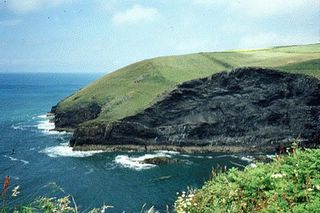
(Beeny Cliff)
I
O the opal and the sapphire of that wandering western sea,
And the woman riding high above with bright hair flapping free -
The woman whom I loved so, and who loyally loved me.
II
The pale mews plained below us, and the waves seemed far away
In a nether sky, engrossed in saying their ceaseless babbling say,
As we laughed light-heartedly aloft on that clear-sunned March day.
III
A little cloud then cloaked us, and there flew an irised rain,
And the Atlantic dyed its levels with a dull misfeatured stain,
And then the sun burst out again, and purples prinked the main.
IV
--Still in all its chasmal beauty bulks old Beeny to the sky,
And shall she and I not go there once again now March is nigh,
And the sweet things said in that March say anew there by and by?
V
What if still in chasmal beauty looms that wild weird western shore,
The woman now is--elsewhere--whom the ambling pony bore,
And nor knows nor cares for Beeny, and will see it nevermore.
After his wife Emma died, Hardy wrote "Beeny Cliff" as a commemoration of their romance and the natural places which were special to them, as the poem's subtitle (March 1870-March 1913) indicates.

1 comment:
A great favourite of mine. Hardy is my 2nd favourite writer, after Shakespeare. The poem is full of haunting sounds and makes great use of Hardy's love of linking West Country places with their past.
Post a Comment